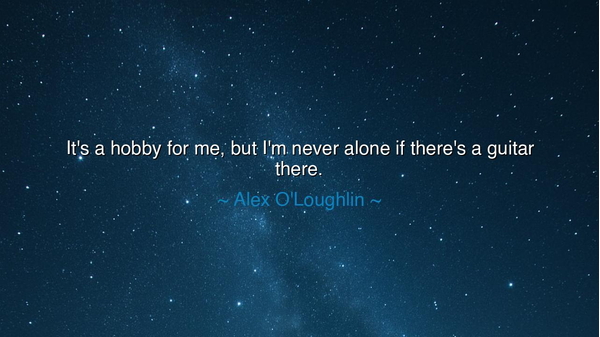
It's a hobby for me, but I'm never alone if there's a guitar






“It’s a hobby for me, but I’m never alone if there’s a guitar there.” — Thus spoke Alex O’Loughlin, the actor and artist whose words reveal a simple yet profound truth about companionship, creation, and the healing nature of art. Though he calls it a hobby, in that humility lies something far greater — the recognition that in moments of solitude, when the noise of the world fades and the heart seeks refuge, a simple instrument can become a friend, a confessor, even a mirror of the soul. The guitar, in his hands, is not a possession but a presence — a reminder that true company is not found only in people, but in the harmonies that speak between silence and sound.
The origin of this quote rests in O’Loughlin’s deep love for music and its power to soothe the human spirit. Known primarily for his work in film and television, he found in the guitar a kind of sanctuary — a quiet world untouched by the demands of fame or duty. When he says, “I’m never alone if there’s a guitar there,” he does not mean merely that he can pass the time, but that the act of creating — of letting fingers meet strings and melody emerge — transforms solitude into companionship. The instrument becomes a living dialogue, an extension of emotion, a bridge between the heart’s longing and the world’s silence.
The ancients, too, knew this truth well. The lyre of Orpheus, whose notes could move trees and stones, was said to be born of grief and longing — an offering of connection between man and the divine. Orpheus’ music was not meant to entertain, but to speak where words could not. In the same way, O’Loughlin’s words carry that same eternal message: that art, no matter how humble, has the power to keep us company when all else fades away. Music is the oldest form of prayer — and every musician, from the shepherd with his flute to the artist in his studio, knows that to make sound from silence is to summon life itself.
There is also a lesson here about solitude, that double-edged companion of the human soul. Many fear being alone, mistaking solitude for emptiness. Yet O’Loughlin’s reflection reminds us that solitude, when filled with creation, becomes sanctuary. The guitar, resting quietly beside him, is a symbol of that sacred balance — of being alone without loneliness. To strum a few chords is to remember that even in silence, there is conversation; even in stillness, there is rhythm. The wise understand that one does not escape solitude — one transforms it.
Consider the life of Ludwig van Beethoven, who, when the cruel hand of fate stole his hearing, refused to surrender his music. Though he could no longer hear with his ears, he continued to compose, feeling every vibration through his bones, every melody through his soul. In his deepest isolation, he found not despair but communion — a dialogue with eternity itself. Like O’Loughlin with his guitar, Beethoven discovered that creation banishes loneliness, that through art one is never truly alone. For where there is expression, there is life; and where there is life, there is connection.
Yet O’Loughlin’s statement also carries an undercurrent of gratitude — a reminder that joy need not come from grandeur, but from simplicity. He does not boast of mastery; he speaks of comfort. The guitar does not need to make him famous; it only needs to make him whole. In this, he joins a long lineage of artists and thinkers who found solace not in the world’s applause, but in the quiet act of creation — a letter written by candlelight, a sketch drawn in solitude, a melody hummed beneath the breath. These are the small acts by which the human heart endures.
Therefore, let this be the lesson: find your guitar — whatever it may be. It need not have strings or sound; it may be a brush, a book, a garden, a craft. Let it be the thing that keeps you company when the world grows still. Learn to fill your solitude with creation, not with noise. For in the act of making — whether art, song, or simple handiwork — you call forth companionship from the depths of your own soul.
For as Alex O’Loughlin teaches us, one is never alone who has found their instrument, their craft, their passion. To create is to commune with the eternal; to play, even quietly, is to remind oneself that life is still singing. And in that melody — fragile, imperfect, yet alive — we discover that the soul, when in harmony with its art, is never truly by itself.






AAdministratorAdministrator
Welcome, honored guests. Please leave a comment, we will respond soon